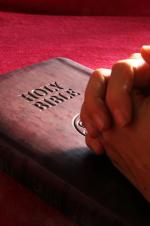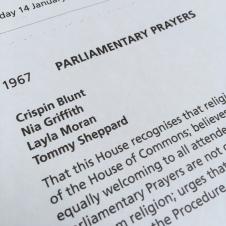We don't think religious worship should play any part in the formal business of the state.
We want to see parliamentary and local government meetings conducted in a manner equally welcoming to all attendees, whatever their personal beliefs.
Parliamentary prayers
Sittings in both the House of Commons and the House of Lords begin with Anglican prayers. MPs and peers stand for prayers facing the wall behind them – a practice thought to have developed due to the difficulty members would historically have faced of kneeling to pray while wearing a sword.
When the chamber is at its busiest, parliamentary prayers act as a bizarre and antiquated seat reservation system. Even MPs and peers who are slated to speak have no option but to attend prayers in order to reserve a seat.
Whilst they may be viewed by some as an important tradition, parliamentary prayers serve to assert the superiority of Christianity (and the Church of England in particular) at Westminster. This 'tradition' is inimical to a modern, pluralistic, secular democracy.
In the Scottish Parliament, Tuesday afternoon sessions begin with 'Time for Reflection', with faith and belief representatives invited to addresses members for up to four minutes. The Northern Ireland Assembly begins formal business with a period of two minutes of silent prayer or contemplation. The Welsh Assembly has adopted no such rituals.
Parliamentarians who wish to pray are free to do so. But prayers should not form part of the official business of Parliament.
Council prayers
Many local authorities in Britain also begin their meetings with prayer.
Local democracy should be equally welcoming to all sections of society, regardless of their religion or belief. Council meetings should be conducted without anyone feeling excluded, or compelled to either participate in prayers or absent themselves from part of the meeting.
Council prayers open the door to wholly unnecessary conflict and sectarian squabbles within local authorities. There is a history of local councillors being bullied and marginalised for challenging council prayers.
The absence of prayers from the formal business of meetings in no way impedes religious freedoms or denies anybody the right to pray. Conversely, organised worship in secular settings imposes worship on those who do not share the faith. A genuine commitment to freedom of religion or belief is incompatible with including acts of worship in the formal business of council meetings.
If local authorities wish to hold a moment of silent reflection at the beginning of a meeting, or if councillors wish to meet for prayers prior to the meeting, they are at liberty to do so.
Take action!
1. Write to your MP
Please enter your postcode and urge your MP to support an alternative to parliamentary prayers, to make parliament more welcoming to people of all faiths and none.
2. Share your story
Tell us why you support this campaign, and how you are personally affected by the issue. You can also let us know if you would like assistance with a particular issue - for example, if you would like to challenge prayers at your own council.
3. Join the National Secular Society
Become a member of the National Secular Society today! Together, we can separate religion and state for greater freedom and fairness.
Latest updates
NSS asks equality charity to reconsider support for council prayers
Posted: Thu, 6 Jun 2019 14:55
The National Secular Society has asked an equalities charity to reconsider its support for prayers at council meetings after the charity's chief executive dismissed concerns about their impact.
NSS chief executive Stephen Evans wrote to Kent Equality Cohesion Council (KECC) expressing disappointment at remarks on the subject in a the newspaper Kent Online this week.
KECC chief executive Gurvinder Sandher claimed people from non-Christian faiths should respect the Christian tradition, saying: "This shouldn't be about our differences but as a way of bringing all faiths together."
He was responding after the chair of Kent Humanists, Steve Bowen, called prayers at the beginning of council meetings "exclusionary".
Bowen said: "Religion, and specifically the Christian religion, is still the default position in our national life despite being a minority belief in the 21st century but we live in a pluralist society."
KECC is a registered charity that says it aims to reduce inequality, eliminate discrimination and "promote good relations between diverse communities" to "strengthen community cohesion" in Kent.
In the letter, Mr Evans said he was "disappointed" that Sandher had "dismissed concerns that the prayers are exclusionary, alienating and undermine equality".
"Christians should respect non-Christians, including the non-religious, by not imposing Christian prayer on democratic processes that apply to us all."Council prayers may bring together those who do pray, but at the expense of discriminating against the great numbers of people who do not."
He said Sandher had revealed a "very disappointing lack of regard" for people of no faith, who make up over 50% of the UK population according to the latest British Social Attitudes survey.
"I would hope that Kent Equality Cohesion Council would seek to ensure that local authority meetings are conducted in a manner equally welcoming to all attendees, regardless of their individual religious beliefs or lack of belief. The inclusion of acts of religious worship in civic meetings can be inimical to this aim."
He asked KECC to "advocate for all elected councillors, and indeed members of the public, to be accorded equal respect and esteem at council meetings, regardless of their privately held religious beliefs, or indeed lack of them".
Nine of Kent's 14 local authorities have lord mayors, who can appoint chaplains to host prayers in council meetings and community events. The chaplains, who are often from the Church of England, address councillors at the beginning of full council meetings with prayers or blessings.
The south east is one of the least religious areas in the country, according to research by Professor Stephen Bullivant of St Mary's University in west London.
The National Secular Society campaigns for parliamentary and local government meetings to be conducted in a manner equally welcoming to all attendees, irrespective of their personal beliefs.
In 2012 the High Court ruled that local councils in England and Wales did not have the authority to include prayers on the agendas of council meetings after a judicial review initiated by the NSS.
But in 2015 parliament passed a bill allowing councils in England to hold prayers as part of their official business.
Prayers shouldn’t be part of parliamentary business, say MPs
Posted: Mon, 14 Jan 2019 16:34
MPs have called for an end to the practice of holding prayers in parliament before the start of official business in a motion backed by the National Secular Society.
Conservative MP and NSS honorary associate Crispin Blunt has tabled a motion which says "religious worship should not play any part in the formal business of the House of Commons".
The early day motion, which has cross-party support, says parliamentary meetings "should be conducted in a manner equally welcoming to all attendees, irrespective of their personal beliefs".
It adds that parliamentary prayers are "not compatible with a society which respects the principle of freedom of and from religion".
NSS honorary associates Nia Griffith of Labour and Tommy Sheppard of the SNP, along with Layla Moran of the Liberal Democrats, signed the motion as it was submitted last week.
Early day motions are single-sentence motions which formally call for a debate on a subject at an early opportunity and which MPs are invited to sign.
Sittings in both the House of Commons and the Lords begin with Anglican prayers. In practice, prayers also act as a seat reservation system, meaning MPs and peers who wish to attend or speak in busy sessions often effectively have to attend them.
Explaining his decision to sign the motion, Tommy Sheppard told the NSS: "Parliamentary prayers is one of many archaic Westminster procedures that is long overdue a rethink. The current system completely ignores that MPs, and society as a whole, come from all faiths and none.
"We need to review how we start our day here in parliament to ensure it's inclusive and accessible for all."
Crispin Blunt said: "Whilst religious worship occupies a strong part in some people's lives, it should no longer play a role in the way we conduct our political affairs as an independent, open and diverse nation.
"In 2019 parliamentary prayers for most MPs are the price paid to reserve a favourite place on the green benches for the day. There are plenty of opportunities to pray voluntarily.
"Parliament and political thinking must be free in order to remain independent. Indeed this early day motion calls simply for a tolerant democracy that treats all belief systems alike."
The NSS has written to the Commons procedure committee to ask it to consider the issue. The society is also encouraging supporters to write to their MPs to urge them to sign the motion.
NSS chief executive Stephen Evans said: "Religious worship is for individuals who choose it – not for nations or legislative bodies.
"Members of parliament are of course free to pray in their own time, but institutionalised prayer doesn't belong in the legislative process. Parliament should reflect the country as it is today.
"Ending this anachronism would be tangible example of the reform needed in the house and represent a positive step forwards for modernity, equality and freedom of conscience."
The NSS campaigns for an end to official government prayers both in parliament and in local councils.
The motion in full reads:
"That this house recognises that religious worship should not play any part in the formal business of the House of Commons; believes that parliamentary meetings should be conducted in a manner equally welcoming to all attendees, irrespective of their personal beliefs; further believes that parliamentary prayers are not compatible with a society which respects the principle of freedom of and from religion; urges that prayers should not form part of the official business of parliament; and calls on the procedure committee to consider alternative arrangements."
UPDATE (May 2019): In a response to the NSS's letter Charles Walker, the chair of the procedure committee, said he was "content to discuss" the proposal with the committee "once we have disposed of currently pressing business".




